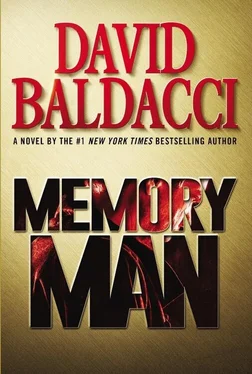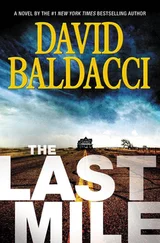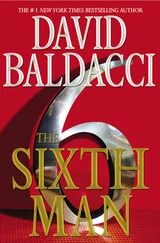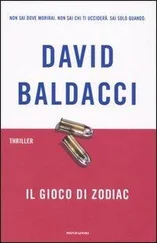A man appeared from down one aisle. He had a mop in hand and was using it to steer a bucket with soapy water in it. Decker ran his gaze over him, his police training guiding his eye to certain vital statistics. He was white, midthirties, an inch under six feet, very lean and wiry, with narrow shoulders. His short-sleeved shirt showed off the veins in his arms. His hair was brown and curly and fell like apple peelings across his head.
The woman looked up at him just standing there in the doorway. “Can I help you?” she asked. She had no accent.
He came forward and took his phone from his pocket. He hit a couple buttons and held it up.
“You ever see this guy before?”
She looked at the photo of Sebastian Leopold. “Who is he?” she asked.
“Some guy that either might have worked here once or hung around here at some point.”
She shook her head. “I don’t remember seeing him. Why you want to know?” Decker fished out his PI license and flashed it in front of her. “I’m trying to find him. He might be due some money. Got a line on him that brought me here. How about your friend over there?”
He looked at the man who was leaning on his mop and studying him quizzically.
The woman said, “Billy, you want to look at this picture?”
Billy parked his mop and bucket against a rack of candy bars, wiped his hands on his faded jeans, and ambled over. He looked pleased to have an excuse to stop cleaning the linoleum.
He looked at the photo and then shook his head. “Nope. Don’t look familiar to me. Weird-looking dude. Spacey.”
Decker lowered the phone. “How long have you two been here?”
The woman said, “Nearly six months for me. Billy came just a few weeks ago.”
Decker nodded. Too recent, then . “And the people here before you?”
She shrugged. “I don’t know. There was a woman, a couple of men. Turnover is high here. The pay is not very good. And the hours are long. I wouldn’t be here if I could find something better. But the job market sucks,” she added bluntly.
Decker looked at Billy. “You?”
Billy grinned. “I don’t know nuthin’ ’bout this place. Just drawing a paycheck, man. Beer money on the weekends. Looking to have a good time with the ladies. Need cash for all that.”
He went back to his mopping.
“I’m sorry we can’t help you,” said the woman.
“Part of the job,” said Decker. “Thanks.”
He turned and left.
His phone buzzed. He looked at it.
Lancaster.
He put it away without answering.
It rang again.
He looked at it again.
Lancaster .
He sighed, hit the answer button.
“Yeah?”
“Amos?”
Decker immediately went rigid. Lancaster sounded nearly hysterical. And she wasn’t the type ever to do so.
“Mary, what is it? Not another shooting?” Decker had been worried about this from the start. Things about the attack at Mansfield had made him believe that the guy was—
“No,” she said breathlessly. “But, but there’s some-something—”
“Where are you?” he interrupted.
“At Mansfield.”
“So it has to do with Mansfield? You found some—”
“Amos!” she shrieked. “Just let me finish.”
Decker fell silent, waited. It was as though he could hear her heart beating from across the digital ether.
“We ran ballistics on the pistol used at Mansfield.”
“And what did—”
Interrupting, she said, “And we found a match.”
His grip tightened around the phone. “A match? To what?”
“To the gun that killed your wife.”
A .45 Round.
Semi-jacketed. Hollow-point.
An SJH, in ballistics shorthand.
It was a brutally efficient piece of ordnance. Not exactly a dum-dum, named after Dum-Dum, India, where a British army officer had invented a bullet that mushroomed out on impact and acted as a miniature wrecking ball inside the body.
Innovation wasn’t always good for you.
The .45 SJH had blown right through the front of Cassie Decker’s skull and ended up lodged deep in her brain. It had been dug out of her during the autopsy and the slug preserved as evidence in her murder investigation. It had retained enough of its shape and lands and grooves to one day be matched to the weapon that had fired it. Well, they didn’t have the weapon, but they had something else.
Now they knew that the very same pistol that had fired the bullet ending Cassie Decker’s life had also terminated the lives of half the victims at Mansfield. The other half had endured the blunt force of the shotgun. The medical examiner had removed the matched round from Kramer, the gym teacher and, per normal protocol, run it through the department’s database. The hit had been immediate.
Because of the magnitude of the finding, the FBI had run its own tests on the slug and came back with the same conclusion.
Same gun. Ballistics didn’t lie. The grooves and lands on the bullets’ respective hides had matched like a fingerprint. And that wasn’t all. They had recovered the single bullet casing from the Deckers’ bedroom. They had compared it with several of the casings found at the school. The pinprick on the bottom of the casing where the firing pin strikes was nearly as good as a fingerprint. And it too had matched on all salient points.
The murders of Decker’s family and the massacre at Mansfield were now inextricably connected.
Decker huddled in his coat as he stood outside the darkened façade of the school, enduring the driving rain pinging off his hair and burly shoulders. The case had mushroomed from Mansfield High to his home on a quiet street with symbolically an ocean’s distance in between. He had never given any thought to a connection between the two crimes. Now that fact dominated him.
There was a chance that there were different killers. Since the shooting at his house, the gun could have been lost by, taken from, or sold by the original killer. The same gun was often used in different crimes by different perps. But Decker believed it was the same shooter in both instances. And if that was the case, it let Leopold out. So Leopold was lying. Yet it was possible he had been told facts of the Decker case by the real killer. And if that were so, then Leopold was the best hope he had to find the person who had murdered his family. And all these others.
Despite the recent writing on the bedroom wall, the case was cold on the Decker family end. Conversely, it was red hot on the Mansfield High School end. So the Mansfield end was where he would focus — that and on Sebastian Leopold. If Leopold knew who the Decker killer was, then he knew who was behind the Mansfield crimes too.
He flashed his credentials at the perimeter security and walked through the front entrance. Yesterday had been disjointed and confusing for him in all respects. He didn’t know if he belonged in the middle of all this. He felt cut off from everyone and everything going on around him. But with the possible connection to the murders of his family, Decker knew that he did belong. He would be on this case for as long as it took. They would have to dynamite him out of here.
He didn’t head to the command center in the library. He went to the cafeteria and stared at the freezer. Then he looked at the ceiling tiles.
Cammie fiber, possible gun oil. Maybe all bullshit. Maybe.
He looked at the exit door. False lead too, or so he now believed.
He left the cafeteria, walked down the hall fronting the library, turned right onto the main corridor that bisected the first floor, and counted his steps off as he made his way to the rear of the school.
At each intersection with another hall he studied the lay of the land, first left, then right. Classrooms on both sides. The last corridor was where Debbie Watson had died. And where, to the left, so had Kramer the gym teacher over his breakfast sandwich and coffee. The rear entrance with the camera faced him. The angle of the camera still intrigued him. That had been deliberate. And deliberate action always had a deliberate motivation.
Читать дальше












